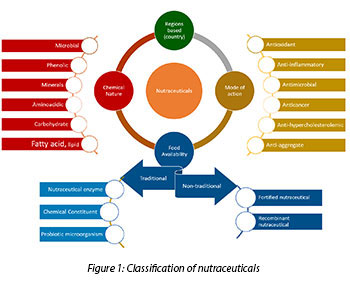"Nutrition" and "pharmaceuticals" are both included in the term nutraceuticals. The term "Nutraceutical" was coined in 1989 by Dr Stephen DeFelice, who founded the Foundation of Innovation Medicine in Crawford, New Jersey. Over the past three decades, the concept of nutraceuticals has changed. The Covid-19 pandemic crisis and growing emphasis on general health are contributing to the rise in popularity of nutraceuticals.
Products that aid in preserving immunity and preventing illnesses are included in the category of nutraceuticals. A major contributing factor to lifestyle-related illnesses is poor diet, therefore, they help the human body function at its best. Numerous nutraceuticals are becoming more and more well-liked because of their demonstrated medicinal potentials. Dietary supplements and functional foods are the two primary categories into which nutraceuticals fall.
“Let food be thy medicine and medicine be thy food” was quoted by Hippocrates in 400 BC.
The classification of nutraceuticals is presented in Figure 1. The pathophysiology of disease and health is greatly influenced by dietary factors. The majority of lifestyle-related conditions, such as diabetes, hypertension, and obesity, are linked to diet. A person who is malnourished has a weakened immune system and is therefore more vulnerable to illnesses. Due to the prevalence of nutritional inadequacies in developing nations like India, government healthcare programmes have been established to treat conditions including anaemia, goitre, and blindness. Enhancing the nutritional status of its citizens has been a priority for the Indian government.
This relationship between our country's economic position and nutritional status has been highlighted by the Covid-19 pandemic scenario. The pandemic's lessons will probably increase the focus and significance of nutrition in healthcare plans, public health initiatives, and programmes more than ever before in order to avoid illness. Additionally, the Covid-19 pandemic has caused a change in consumer behaviour by emphasising health and wellbeing. The importance of strengthening one's immunity has grown dramatically when combined with our nation's rich history of herbal and Ayurvedic therapy.
As one of India's largest sectors, agriculture provides a wealth of raw materials and components for dietary supplements and nutraceuticals. Additionally, other cutting-edge sources, such as the marine environment, are being investigated for health supplements and nutraceuticals. The nutraceutical business in India can grow more quickly because of the country's abundance of highly qualified workers, manufacturing know-how, and quality.
 Nutraceutical market in India
Nutraceutical market in IndiaVariant Market Research's Global Nutraceuticals Market Report projects that the global market will grow at a compound annual growth rate (CAGR) of 7.2% from 2016 to 2024, reaching $340 billion.
By the end of 2025, the Indian nutraceutical market is projected to have grown ~$500 billion. That is to say, in just five years, it has expanded by more than four times. Foreign investors' have shown great interest in the nutraceutical industry.
Uses of significant nutraceutical products in IndiaFor hundreds of years, people have been using nutraceuticals. Type 2 diabetes, inflammatory bowel disease, various enteropathies, and malabsorption disorders that lead to nutritional deficiencies are only a few of the chronic conditions that highlight their significance. Fish oil, flaxseed oil, vitamin B12, and vitamin B6 all affect the production of steroids, control the menstrual cycle, and lower the risk of premature labour. Heart failure, peripheral vascular disease, cerebrovascular disease, hypertension, and coronary heart disease are all significantly influenced by dietary practices. By changing cellular metabolism, polyphenols, vitamin D, folic acid, coenzyme Q 10, and omega-3 fatty acids may lessen artery disease. Fruits like grapes, apples, and cherries, as well as vegetables like onions, contain flavonoids.
Ginger's antioxidant and anti-inflammatory properties are used to reduce hypertension and palpitations. Phytosterol-rich green and yellow vegetables reduce the risk of cardiovascular diseases by blocking the absorption of cholesterol. Beta-carotene, lutein, lycopene, curcumin, and turmeric are nutraceuticals that may help cure neurological disorders like Parkinson's and Alzheimer's by lowering oxidative stress. Research has demonstrated that jujube can help people with Alzheimer's disease regain their memories. It has also been shown that a variety of herbal treatments containing Tulsi, Amla and Guduchi improve memory and learning.
Regulation of nutraceuticals in India
The Food Safety and Standards Authority of India (FSSAI) regulates the standards for health supplements and nutraceuticals in India. The Government of India is also planning to include nutraceuticals under the Central Drugs Standard Control Organisation (CDSCO) instead of FSSAI to promote the safety of the consumers.
Future prospects for the Indian nutraceuticals business
Nutraceuticals are a potentially growing sector of the economy that combine nutrition and medicine to offer all-encompassing medical assistance. They can support and treat several types of cancer, prevent diseases including cardiovascular disease, and be used as dietary supplements, among other medical uses. Because of this, the nutraceutical business is well-versed in the potential health advantages of nutrients. Currently, drugs are believed to be used in medicine. In contrast, nutrition is only considered a useful tool for maintaining a healthy lifestyle. Because of their interactions and complementary qualities, it is anticipated that further work will be done in the years to come. The application of contemporary technologies, such as genetically modified food and nanotechnology-based nutraceuticals, leads to improved medical care and treatment outcomes, which further extended the rise in the nutraceutical revenue market.
The nutraceuticals market is expected to develop at a compound annual growth rate (CAGR) of 15% between 2023 and 2028. Numerous international nutraceutical businesses are turning their attention to India, buoyed by the market's potential. Furthermore, the country's consumers are more concerned with the items' efficacy and quality than with their cost.
(The author is assistant professor, Delhi Pharmaceutical Sciences and Research University, New Delhi. He can be reached at anoopdpsru@dpsru.edu.in)